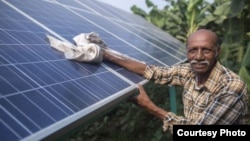A humanitarian organization says Zimbabwe has to scale up the use of solar energy as an alternative power source since the country has a deficit in electricity supplies.
Speaking to Studio 7 on the sidelines of a solar fair held in Bulawayo over the weekend, Thulani Ncube, renewable energy advisor with SNV Netherlands Development Organisation, said Zimbabwe is endowed with abundant sunshine which it can utilize for solar energy.
Ncube said it is important for the country to explore other possible energy sources given the acute shortage of power that it faces.
He explained that the solar fair, the first of its kind in Bulawayo, is part of a rural solar market development programme in which his organization, in collaboration with the government and other stakeholders, seeks to encourage the use of solar energy as a way of helping bring development to Zimbabwe’s rural areas and the whole nation.
“We have created this platform so that consumers can interact with suppliers of solar products at a platform that is conducive for dialogue where the consumers can ask questions and the suppliers in return provide the answers. You find that there are so many barriers when it comes to the development of the solar market and one of them is lack of knowledge -people not knowing about solar energy and its capabilities; what it can do and what it cannot do,” said Ncube.
ZIMBABWE POWER CAPACITY
Statistics on solar energy usage in Zimbabwe are not readily available. But the country has a daily electricity demand of 2200 mega watts against the current capacity of 1100, leaving it with a huge deficit with the resultant frequent power outages.
Samson Mathema, who is a sales and marketing manager for a company that supplies and installs solar powered products and exhibited at the fair, also said although the uptake of solar energy is increasing globally, in Zimbabwe it still remains low.
Mathema said although there are low import duties on solar-powered geysers, it is expensive to import other solar products.
He urged government to come up with more coherent policies that encourage the use of solar energy as is the case in South Africa.
“I think South Africa looked into their energy consumption ahead of time and realized that they had a serious backlog, so as a result they introduced an initiative where if you put solar-powered water heaters in your house, they pay a subsidy. What actually happens is the installation company will come and install for the people and then they will claim from Eskom. So if Zesa could duplicate such systems it could reduce the load on their grid and encourage people to put up solar systems,” said Mathema.
SOLAR WATER PUMPING
Some members of the public, who attended the solar fair, said they acquired a lot of knowledge about solar energy at the event.
A woman, who only identified herself as Mrs. Mushonga, said she had been impressed by a solar lighting system that can provide lights for a house and also power gadgets like TV and radio.
She said although the initial set up costs are high, it is offset by the fact that solar energy is virtually free and the sunshine is often available throughout the year.
Another local, Chris Manyaya, told Studio 7 that he was impressed by a solar-powered water pumping system which was on display at the show.
“I have been impressed by the solar water pumping system which I have seen and have been told a bit about. It is a good device and relatively cheap when it comes to cost because you can pump water from a borehole using solar energy and then you can do all your chores like watering the garden and so forth. I think it’s particularly useful in the rural areas,” said Manyaya.
The rural solar market development runs under the theme “Solar kumusha; Isolar emakhaya”. Similar fairs have been held in Gwanda and Masvingo.
SNV Netherlands Development Organisation says it hopes to make the solar fair a national event as a way of helping enhance the use of solar energy.





